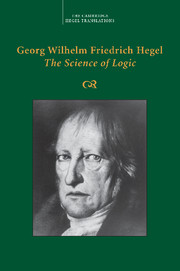Chapter 3 - The Syllogism
Published online by Cambridge University Press: 30 September 2021
Summary
The syllogism is the result of the restoration of the concept in the judgment, and consequently the unity and the truth of the two. The concept as such holds its moments sublated in this unity; in judgment, the unity is an internal or, what amounts to the same, an external one, and although the moments are connected, they are posited as self-subsisting extremes. In the syllogism, the determinations of the concept are like the extremes of the judgment, and at the same time their determinate unity is posited.
Thus the syllogism is the completely posited concept; it is, therefore, the rational. – The understanding is taken to be the faculty of the determinate concept which is held fixed for itself by virtue of abstraction and the form of universality. But in reason the determinate concepts are posited in their totality and unity. Therefore, it is not just that the syllogism is rational but that everything rational is a syllogism. Syllogistic inference has long since been ascribed to reason; but, on the other hand, reason in and for itself, and rational principles and laws, are so spoken of that no light is thrown on why the one reason that syllogizes, and the other which is the source of laws and otherwise eternal truths and absolute thoughts, hang together. If the former is supposed to be only a formal reason while the latter is supposed to be the one that generates content, then one would expect on this distinction that precisely the form of reason, the inference, would not be missing in the latter. And yet, the two are commonly held so far apart, the one without mention of the other, that it seems as though the reason of absolute thoughts were ashamed, so to speak, of inferential reason, and the syllogism were listed as also an activity of reason merely as matter of tradition. But surely, as we have just remarked, logical reason must be essentially recognizable, when regarded as formal, also in the reason that is concerned with a content; indeed, no content can be rational except by virtue of the rational form.
- Type
- Chapter
- Information
- Georg Wilhelm Friedrich Hegel: The Science of Logic , pp. 588 - 624Publisher: Cambridge University PressPrint publication year: 2010

